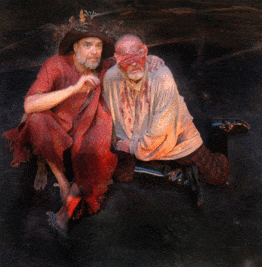King Lear, a Shakespearean play, was one of the most popular plays in its time for its values and universal themes. It has had many takes and has influenced many other playwrights. It is a crucial story about a man, a father, and a king, in his downward spiral of life.
This text has persisted through the ages because of its relatability to the audience. King Lear shows how being a parent is tough and how treating children differently can end with a dark outcome. This is shown in the parallel storylines between Gloucester and Lear. Both are ignorant of their own children’s acts and still see them as young and innocent.
These texts appeal to the audience of any time was the noticeable parallel storyline of two families. Lear and Gloucester were friends, so close that Gloucester even made Lear a Godfather to one of his children. Shakespeare writes these storylines differently but reinforces and lengthens these parallels by introducing many similarities of characterization over the two plots. He uses language that is evident in the two stories and mirrors certain themes; for example sight – Finally, he addresses themes that echo between the two stories.
The reflections are that both Lear and Gloucester are fooled easily and couldn’t see that they had sent their ‘good’ children away in bad faith and seemed to trust the malicious ones. Lear had been distraught when Cordelia could not ‘heave her heart into her mouth’ and Gloucester was quick to plan to murder his own child for a crime he has been framed with – “Had he a hand to write this, a heart and brain to breed it in?”(1.2.45). It is evident, they were both quick to dismiss them, not seeing what they had done.
Both Cordelia and Edgar had been misjudged and by speaking the truth was banished. Neither Goneril and Regan nor Edmund seem to truly love their fathers or want their father’s love or approval. So they plot against their siblings and in hindsight they simply wanted them gone.
It is to be thought that Gloucester does not love Edmund as he did Edgar, but in truth, he loved Edmund more as a son. Though it is not told, the audience can guess that Gloucester doesn’t really care for Edgar, he would throw him aside like a rotten piece of fruit. Gloucester couldn’t see that Edgar would not have done such an egregious act against his father; it was almost like he was playing favorites and trusted Edmund’s word over Edgar’s.
Shakespeare differentiates between the two storylines by also putting them in different social statuses. Whilst Lear is king, he has subjects, workers, and laws to handle, while still being a father. Whereas Gloucester is only an Earl; only having to care for those in his stead. This difference is a big impact, as they have a vast difference in jobs, yet they seem to make the same mistake with their children. The Divine Order – Lear is the next person under God, and then Gloucester is under Lear. This being said everything that Lear does, is looked upon as if God was telling him right from wrong, thus the people immortalizing him. When he banished Cordelia, everyone else did as well.
At this time, Shakespeare had given us the only character who seemed to be the only one to see the truth in everything. Kent, a nobleman with the same rank as Gloucester, was trusted by the king and when the event happened he saw the wrong in Lear’s doing. “When majesty falls to folly.” (1.1.150) Kent took it upon himself to tell the king that what he was doing was in fact wrong and out of line. “And in thy best consideration check this hideous rashness.” (1.1.150).
As said in the quote, Kent says that when the king turns to folly, it is in his best wishes to make the king see what is right. After Lear still dismisses him, he apologizes deeply, not to Lear, but to Cordelia; saying that he is incredibly sorry for her father’s wrongdoing. The audience at this point then understands fully that Lear is in fact wrong and they sympathize with Kent for only wanting the king to just see that his need for flattery is harming his decision-making.


Helpful